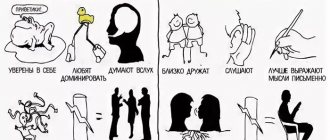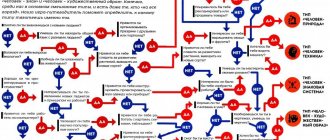This test does not claim to be scientific or 100% accurate. It is based on the Myers-Briggs Questionnaire Myers-Briggs Type Indicator, which is used to identify a person’s individual characteristics. Such testing in an extended version is sometimes taken when applying for a job and before entering a university. We offer you a shortened version.
Remember that this test only helps to roughly outline the brightest aspects of your personality, so do not take its results too seriously. 
Why you need to know your personality type
Each person has a unique set of traits. You will not meet two absolutely identical people. However, there are some regularities in the formation of individual characteristics.
People who have similar innate characteristics (type of nervous system, characteristics of mental processes, natural inclinations) and develop in similar socio-cultural conditions are very similar to each other.
In this regard, people several thousand years ago became concerned with creating a universal classification of people.
How to find out your personality type
There are several ways you can determine your personality type. Not all of them are equally effective. Let's take a quick look at each of them.
- Special diagnostic techniques
This is the most reliable and reliable method. Psychological tests are developed by professionals and tested for accuracy and validity. Therefore, their results can be trusted 80%. “Why not 100?” - you ask. Much depends on how honestly and responsibly you answer questions and complete tasks.
Below you will find 10 methods for determining your personality type, with which you can type yourself. They are based on different criteria, so the more tests you pass, the more detailed your psychological portrait will be.
- Specialist consultation
An experienced psychologist types people with high reliability, based on his extensive professional experience. But it necessarily relies on diagnostic techniques too. Such typing can be more accurate, since the specialist knows how to bypass the client’s psychological defenses.
- Introspection
This is the simplest, but at the same time the most unreliable method. It is difficult for a person to objectively assess his characteristics, because psychological defenses seriously distort perception. Therefore, this method must be supplemented with others.
To try to type yourself, you must first carefully study the available psychological classifications, read the descriptions of the types, try on their characteristics for yourself, and try to find similarities and differences.
Short story
The background to the emergence of typology goes back to the works of Carl Jung, who, in his book “Psychological Types” published in 1921, suggested that there are four main psychological functions that help a person perceive the world. These are thinking, feeling, intuition and sensations. This work was much more fundamental than the ideas of the American Katherine Briggs, who was simply interested in the differences in the characters of different people. But, having become acquainted with Jung’s typology, she, supported by her daughter Isabel Briggs-Myers, began to study this issue in detail and even published a couple of scientific articles. She also identified four types, and was based, by her own admission, on the works of Jung. But later the theory was significantly expanded by her daughter, giving it a modern outline.
This happened during the Second World War. It was then that the Myers-Briggs Type Indicator (MBTI is actually a typology; the term “socionics” is also often used). This was not a “naked” theory - the researchers relied on original tests that they themselves compiled. The purpose of the research was the most noble: on the basis of testing, to determine individual personal preferences in work and to select for women who were supposed to replace men who had gone into the army in production, occupations where they could properly demonstrate their talents. Later, in the 50-60s, prominent scientists spoke positively about the typology, and new experiments were carried out to refine the methodology. But besides its followers, the MBTI also has a number of critics who point out that the Myers-Briggs typology almost duplicates the research of C. Jung in the theoretical part and does not always demonstrate its validity in practice.
Determining personality type using psychological tests
Psychological tests are widely used by teachers, HR specialists, sports coaches, doctors, criminologists and, in fact, psychologists themselves. With their help, experts create a detailed portrait of a person’s personality, on the basis of which they can correctly predict his behavior and build the most effective model of interaction with him.
It would also be nice for the person himself to get to know himself better. This will greatly simplify your life and make it more conscious. Knowing your characteristics, you can pick up the keys to the hidden reserves of the psyche.
Each test is accompanied by various recommendations: what profession to choose, how to smooth out your shortcomings and emphasize your strengths, what communication style to choose, etc. You just need to answer the questions carefully and honestly.
With these tests you can test not only yourself, but also other people. Testing of a child must be carried out under adult supervision.
More than 100 cool lessons, tests and exercises for brain development
Start developing
Professional techniques
Let's start with techniques developed by professional psychologists. These tests will show the most correct and accurate results.
- Eysenck test for determining temperament
It is best to start self-knowledge with this technique. Classifying people by temperament type is the basis on which all other typologies are based.
The test will help determine who you are: phlegmatic, choleric, sanguine or melancholic. The types are identified based on the characteristics of the human nervous system. They are innate and unchanged throughout life.
- Extroversion/introversion test
Swiss psychologist Carl Gustav Jung was the first to divide people into extroverts and introverts. This classification is based on the direction of a person’s energy: for extroverts it is directed to the outside world, and for introverts it is directed inward. Therefore, extroverts are sociable, cheerful, and energetic, while introverts are calm and reserved.
A little later, this classification was supplemented by another type - ambiverts. Representatives of this type combine the traits of both introverts and extroverts. According to the latest data, the world's population is distributed as follows: extroverts - 40%, ambiverts - 40%, introverts - 20%.
- Test to determine character type according to Kretschmer
The German scientist Ernst Kretschmer connected a person’s character traits with his physique. He noticed that people with similar morphological structures have similar psychological traits. Based on observations and experiments, he divided people into three types: picnics, asthenics and athletics. The test will help you determine which one you belong to.
- Leonhard-Smishek questionnaire on character accentuation
Accentuation is a character trait in which individual traits are overly pronounced. For example, anxiety can be either a normal character trait or an accentuated one. In the second case, a person experiences anxiety, even if there is no objective reason for this.
The German psychologist Karl Leonhard studied accentuations. He identified 10 personality types in accordance with a person’s prevailing accentuation. And Hans Schmischek developed a questionnaire based on this classification.
- John Holland Professional Personality Test
American psychologist John Holland has developed a technique that allows you to determine a person’s professional orientation.
The personal qualities required for each specific type of activity are combined into 6 large groups. Based on their predominance in humans, 6 personality types have been identified: realistic, investigative, social, conventional, enterprising, artistic.
Determine which one you belong to to understand which type of activity you can achieve the best results in.
Self-love and what is its strength
Let's start with what self-love is. For some of us, this is rewarding ourselves with gluttony for the joyless vanity that they consider their life to be. We indulge ourselves with late dinners, loading our bodies with unnecessary calories and useless shopping. Then comes the moment of regret (note – regret, not repentance). We moan, find a lot of excuses and start again! And for others?
There's a lot of talk these days about self-love. This sounds great, but what does it really mean? How do we love ourselves and why is it so important?
Self-love means you accept yourself fully, treat yourself with kindness and respect, and support your personal growth and well-being. Self-love includes not only how you feel about yourself, but also your thoughts and feelings about yourself.
When you love yourself, you have an overall positive view of yourself. This doesn't mean you feel confident all the time. This is unreal! For example, I can temporarily feel upset, angry, or disappointed with myself and still love myself. If this is confusing, think about how it works in other ways. I can love my daughter even if I sometimes feel angry or disappointed with her. Even in this moment, my love for her informs how I feel about her. This allows me to forgive her, respect her feelings, meet her needs, and make decisions that will support her well-being.
Self-love is the desire to maintain the strength of your body in a variety of available ways. The category of people who truly love themselves does not want to indulge base desires.
But believe me, they are a minority. Let's applaud them and return to our sinful majority.
Our strength is that we admit our weakness. Let's try to turn our flaws into strengths, or at least just features. Then let’s stop torturing ourselves with moral torment after every piece of cake. Naturally, I do not urge you to go into all serious troubles, not at all. It’s just that by bullying ourselves, we can very quickly develop a feeling of guilt . And it’s very difficult to get rid of it!
Therefore, if you are no longer able to change the situation, relax and love yourself for who you are, with all your strengths and weaknesses. And if you succeed, it will be the greatest victory of your life. Let me make a reservation once again - this is not a difficult struggle of self-torture. This is just your desire to see yourself as different from others.
A woman who is satisfied with her appearance, confident in her irresistibility, makes the same impression on others as those who have the genetic beauty gifted to them by nature. She knows her worth and has self-esteem. And it would never occur to anyone to say that she is ugly.
If we're being completely honest with you, let's agree that everyone can't have the right facial features, long legs, and great hair. But beauty in itself cannot attract others, it can even repel! Only self-respect prevents a person from falling below a certain line (the difference is that everyone’s boundaries are different!).
Where does the path of self-destruction begin?
Where does our path of self-destruction begin with the help of complexes, one of which may be an obsessive attitude towards our appearance in search of flaws - extra pounds, “bulldog cheeks”, a double chin, a crooked or too long nose?
The first people from whom we learn what we are like are our parents. They form the idea of our appearance, our strengths and weaknesses. Any child at the initial stage of life unconditionally believes his parents and, naturally, their opinion is perceived as the truth of the first instance. And so we hear: “You are our beauty! Our charming sunshine! etc. Naturally, a sweetly smiling toothless baby simply cannot evoke feelings other than delight, pride and tenderness.
Time passes and the emotion continues. This is how we get the impression of ourselves as a beautiful princess who is not afraid of any evil sorceress.
The world is falling apart
Time passes, the princess becomes a teenager and suddenly turns out to be an “ugly duckling”: lanky, with acne-prone skin, sharply losing weight (or gaining weight, depending on heredity).
She understands perfectly well that she has certain shortcomings. And parents, who just a few years ago admired their child, begin to look sideways and wonder what hormones do to people. Seeing this, you understand that you were in some way deceived and that you are not such a beauty, and you don’t have that many merits... Your parents, trying, from their point of view, to calm you down, continue to stubbornly repeat that you are beautiful and that this is all nonsense! No, for you this is far from nonsense, for you now more than ever it is important to understand and realize that you are an individual and that everything will change soon.
There is a feeling that the world is collapsing, and you will forever remain so clumsy and unsure of yourself. Your psychological well-being now directly depends on the awareness of your external unattractiveness. Most often, you feel lonely, withdrawn into your own little world, moving away from your parents, and communication with peers is not going well. Surely there are girls in your class whose teenage problems are not so pronounced, and this only causes envy on your part. “Why is everything wrong with me?!” - you scream in your heart.
Don't give up, look for help
If at that moment you had not withdrawn and turned to a psychologist for help, he would have been able to explain to you that everything that is happening to you is natural.
Observing changes in their own appearance and comparing themselves with others, adolescents often exaggerate their real and imaginary physical defects. In some cases, this can lead to deep crisis states, accompanied by changes in self-esteem.
In psychology there is even such a term - “dysmorphophobia” (impaired assessment of one’s physical appearance). One of the signs of developed dysmorphophobia is inappropriately exaggerated attention to minor body defects. Complexes are born...








